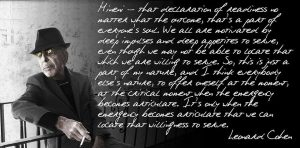The heavenly choir gained another member when Leonard Cohen left the stage last week, at 82. According to his manager, he fell in the middle of the night and died in his sleep on November 7th. Best known for such heart melting hits as Suzanne, Hallelujah, Bird on A Wire and Anthem, he had recorded his final album shortly before his passing. Called “You Want It Darker,” it most definitely was a portent of his passing. On some level, he seemed he had made peace with his life and was ready to move on to whatever awaited him beyond this realm.
The lyrics to the title song:
If you are the dealer, I’m out of the game
If you are the healer, it means I’m broken and lame
If thine is the glory then mine must be the shame
You want it darker
We kill the flame
If you are the healer, it means I’m broken and lame
If thine is the glory then mine must be the shame
You want it darker
We kill the flame
Magnified, sanctified, be thy holy name
Vilified, crucified, in the human frame
A million candles burning for the help that never came
You want it darker
Vilified, crucified, in the human frame
A million candles burning for the help that never came
You want it darker
Hineni, hineni
I’m ready, my lord
I’m ready, my lord
There’s a lover in the story
But the story’s still the same
There’s a lullaby for suffering
And a paradox to blame
But it’s written in the scriptures
And it’s not some idle claim
You want it darker
We kill the flame
But the story’s still the same
There’s a lullaby for suffering
And a paradox to blame
But it’s written in the scriptures
And it’s not some idle claim
You want it darker
We kill the flame
They’re lining up the prisoners
And the guards are taking aim
I struggled with some demons
They were middle class and tame
I didn’t know I had permission to murder and to maim
You want…
And the guards are taking aim
I struggled with some demons
They were middle class and tame
I didn’t know I had permission to murder and to maim
You want…
The Hebrew word, ‘hineni’ translates to “Here I am.”
According to the site Jewcology.org, the origin is The Tanakh (Hebrew Bible) “Hineni is often used by people when they respond to a direct call from God. For example, in Genesis 22, Abraham is first called by God in verse 1 and he responds Hineni and then God gives him the command to sacrifice Isaac. Later in the chapter when Abraham is about to slay Isaac, the angel calls from heaven and Abraham answers Hineni. Jacob responds to a divine call twice with Hineni(Genesis 31:11 & Genesis 46:2). Moses responds to the voice from the Burning Bush with Hineni (Exodus 3:4) and Samuel also begins his prophetic mission with such a response to God’s call (1 Samuel 3:1-10). And the prophet Isaiah responds with Hineni when he experiences his inaugural vision of God and the seraphim in the Temple (Isaiah 6:8).”
My first recollection of hearing the word was in synagogue during High Holiday services. To my child’s mind, it was like standing up and waving to God, saying, “Yo! I’m right here. Can you see me, ’cause I can’t see you? I was told that you are real and that we need to have conversations and that you’re keeping an eye on things.” Now nearing the end of my fifth decade, I am certain that we are both visisble to each other, even though S/he is a shapeshifter who appears in the form of nature, people and animals. Sometimes Spirit blows through as a fierce wind that knocks down trees and at others is a light leaf rustling breeze. Sometimes S/he shows up in the eyes of a Beloved and at others in the face of a tyrant. I am called on to love them both. The first is easier than the second, although I know that person is part of creation too and is challenging me open my heart more, even as I speak up in opposition of tyranny and terror.
I was listening to an interview on NPR in the past month or so that Terry Gross conducted with author Jonathan Safran Foer about his book called Here I Am. The title comes from the words Abraham was said to have uttered in response when God called out to him, “Hineni”. As the author shared a passage about an interaction between the main character and his son, they were beneath a darkened sky and the son asked the father why people whisper when they are in that place. Ineffible. Awe and wonder.
Like Leonard, when my time comes to ‘leave the building,’ I want to be able to say, “Here I am, ready to roll.”


